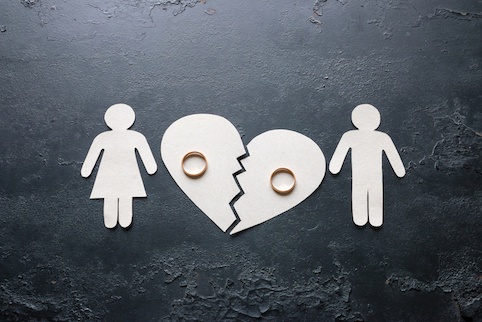 We’ve all heard the statistic. “Half of all marriages end in divorce.” A 50/50 prospect seems dim, no? Well, that data isn’t exactly accurate any longer. While it used to be, the overall divorce rates have been declining for years. A more realistic number is that 1 in 4 unions will end in divorce.
We’ve all heard the statistic. “Half of all marriages end in divorce.” A 50/50 prospect seems dim, no? Well, that data isn’t exactly accurate any longer. While it used to be, the overall divorce rates have been declining for years. A more realistic number is that 1 in 4 unions will end in divorce.
There are multiple factors to consider since the probability of divorce isn’t the same for all couples. While some are quite unlikely to split, others have a higher than fifty percent chance of divorce. For example, those entering into second or third marriage are more likely to view divorce as an easy out when times get tough since they've done it before. There are also usually children from previous exes. These additional people and the issues they bring along with them can be considered "baggage," which can put a strain on new relationships.
On the flip side of that coin, a certain percentage of people learn from their unsuccessful marriages and go into new relationships older, wiser, and more determined to compromise and communicate. Predictions are certainly not “one size fits all.”
When it comes to marriage, patience is a virtue. Millennials are primarily responsible for the plummeting divorce rates. Their increasingly selective nature can explain these falling divorce rates regarding marriage and the greater stability of the couples who persist through cohabitation and enter marital unions at high levels of economic interdependence. In other words, Millennials wait longer, marriage is rarer, it’s more stable than it was in the past, and couples share all responsibilities equally. The social acceptance of living together and the decline of well-paying jobs that allow for financial stability mean that couples who previously would have gotten married younger put off that particular milestone until they’re more confident it won’t end in divorce.
Finally, many factors influence the chance of getting a divorce, so for anyone couple to blindly accept that the 50/50 probability applies to them is a misleading oversimplification that could potentially become disruptive and a self-fulfilling prophecy. Going into a life-long commitment with the idea that you only have a 50/50 chance is damaging. If you believe in your heart that success is a coin-flip and only commit half of yourself, you might walk away when things get tough instead of putting in the work necessary for a successful marriage. Put, if you think that your chances of failing are high, then you are likely to see signs that you are "failing" more readily, and then use those signs as a confirmation that you are failing. This is known as “the confirmation bias." In this case, you may be sabotaging your marriage.
While opposites may attract, values must align. Arguments are almost always traced to differing values, no matter how petty. John Gottman, an American psychological researcher, and clinician who did extensive work over four decades on divorce prediction and marital stability, has identified what destroys a relationship.
Gottman’s Four Horseman of Marriage:
Criticism, Contempt, Defensiveness, and Stonewalling. They represent conquest, war, death, and hunger, respectively.
The number one reason for divorce, by a large margin, is lack of commitment. Without it, there’s no willingness to weather the storms, work through the rough patches, keep the relationship going - and both partners have to be equally committed.
The Top Reasons for Divorce:
- lack of commitment
- infidelity/extramarital affairs
- getting married for the wrong reasons
- too much conflict and arguing
- being out of touch/lack of intimacy
- lack of individual identity/becoming lost in the roles
- getting married too young
- financial issues
- substance abuse
- domestic violence
- not having a shared vision of success
- unmet expectations/unrealistic expectations
- difference in sexual libido
- lack of family support/intrusive parents
- children from previous relationships
- health issues
- weight gain
- lack of equality
- lack of trust/privacy issues
- lack of appreciation
- little or no premarital education and religious difference
- differences in or lack of communication
- laziness/unwillingness to work at the relationship/complacency.
 Divorcing parties often consider the possibility of one party buying out the other’s one-half ownership interest in their marital home. However, I always raise a few “what ifs” if my client is the one contemplating the option of being bought out:
Divorcing parties often consider the possibility of one party buying out the other’s one-half ownership interest in their marital home. However, I always raise a few “what ifs” if my client is the one contemplating the option of being bought out:
 (20)
(20)  People often ask me what I charge for a divorce that is “uncontested”. My initial questions are to establish whether they truly have an uncontested divorce case. If they have children, they will sometimes tell me they have agreed to a 50/50 timesharing (formerly called custody). I then ask whether they have discussed what will be paid in monthly child support, very often they respond with, “neither of us will pay child support to the other”. My follow-up question is, “ok, so do you both make the same amount of money?” Usually, I will get a response such as well no, he/she earns a lot more than me. When one party earns significantly more, the parent with the greater income will normally have to pay some amount of support to the other.
People often ask me what I charge for a divorce that is “uncontested”. My initial questions are to establish whether they truly have an uncontested divorce case. If they have children, they will sometimes tell me they have agreed to a 50/50 timesharing (formerly called custody). I then ask whether they have discussed what will be paid in monthly child support, very often they respond with, “neither of us will pay child support to the other”. My follow-up question is, “ok, so do you both make the same amount of money?” Usually, I will get a response such as well no, he/she earns a lot more than me. When one party earns significantly more, the parent with the greater income will normally have to pay some amount of support to the other. One of the many freedoms we enjoy in America is the freedom to decide when to end a marriage. Divorce is already an emotional and complicated procedure, however, so when one spouse chooses to hide from the process, a few additional steps must be taken to complete the divorce, but divorce is possible, nonetheless.
One of the many freedoms we enjoy in America is the freedom to decide when to end a marriage. Divorce is already an emotional and complicated procedure, however, so when one spouse chooses to hide from the process, a few additional steps must be taken to complete the divorce, but divorce is possible, nonetheless. So, you are going through a divorce. You and your former spouse have agreed on how to divide your personal property. You decide on what becomes of the home, cars, and bank accounts. But who gets the family dog, cat, or other pets?
So, you are going through a divorce. You and your former spouse have agreed on how to divide your personal property. You decide on what becomes of the home, cars, and bank accounts. But who gets the family dog, cat, or other pets? The historical Covid-19 pandemic has turned the world upside down and forced many of us to live every moment of our lives in our homes. This has created an uncharted territory, stirring up new anxiety for those not used to a more quiet life with less social interaction other than family members. This undoubtedly has created a strain on many marriages, for couples not used to spending 24/7 in each other's company. Some experts have predicted a rise in divorces before the end of the year.
The historical Covid-19 pandemic has turned the world upside down and forced many of us to live every moment of our lives in our homes. This has created an uncharted territory, stirring up new anxiety for those not used to a more quiet life with less social interaction other than family members. This undoubtedly has created a strain on many marriages, for couples not used to spending 24/7 in each other's company. Some experts have predicted a rise in divorces before the end of the year. In the United States, 40 to 50 percent of marriages end up getting a divorce. But how much does a divorce cost? And in the state of Florida?
In the United States, 40 to 50 percent of marriages end up getting a divorce. But how much does a divorce cost? And in the state of Florida? Divorce is a tough thing to go through, and it can be not very easy to get the process started as it is going through all the parts. So how do you break it to your spouse that your marriage is over?
Divorce is a tough thing to go through, and it can be not very easy to get the process started as it is going through all the parts. So how do you break it to your spouse that your marriage is over? There is little argument that divorce comes at a pretty hefty price. Not just on the emotional and relationship ties, but cold, hard cash. The public and private costs incurred from divorce are tremendous, and Republicans in the Florida Legislature are presenting a bill for the upcoming session to try and lessen that cost. This bill will create what is called "Florida Guide to Healthy Marriages."
There is little argument that divorce comes at a pretty hefty price. Not just on the emotional and relationship ties, but cold, hard cash. The public and private costs incurred from divorce are tremendous, and Republicans in the Florida Legislature are presenting a bill for the upcoming session to try and lessen that cost. This bill will create what is called "Florida Guide to Healthy Marriages." While there is no legal reason why you can’t start dating before your divorce is final, it’s still a grey area. Just because you can doesn’t mean you should. Dating before your divorce is finalized can seriously affect you legally and financially.
While there is no legal reason why you can’t start dating before your divorce is final, it’s still a grey area. Just because you can doesn’t mean you should. Dating before your divorce is finalized can seriously affect you legally and financially. Divorce is never an easy decision to make. It can typically involve many different factors and even people. There are ways to make the finalization of divorce easier by creating a checklist for yourself before taking it to the serious point of divorce. Knowing how to handle a divorce before papers are signed can be beneficial to both parties and at the very least, give you peace of mind that things are in the right order. Here you will find some of the things to add to your checklist before finalization, ensuring you won't have to deal with any potholes along the way.
Divorce is never an easy decision to make. It can typically involve many different factors and even people. There are ways to make the finalization of divorce easier by creating a checklist for yourself before taking it to the serious point of divorce. Knowing how to handle a divorce before papers are signed can be beneficial to both parties and at the very least, give you peace of mind that things are in the right order. Here you will find some of the things to add to your checklist before finalization, ensuring you won't have to deal with any potholes along the way. We’ve all heard the statistic. “Half of all marriages end in divorce.” A 50/50 prospect seems dim, no? Well, that data isn’t exactly accurate any longer. While it used to be, the overall divorce rates have been declining for years. A more realistic number is that 1 in 4 unions will end in divorce.
We’ve all heard the statistic. “Half of all marriages end in divorce.” A 50/50 prospect seems dim, no? Well, that data isn’t exactly accurate any longer. While it used to be, the overall divorce rates have been declining for years. A more realistic number is that 1 in 4 unions will end in divorce. Getting divorced isn't typically a joyous occasion, especially when there are children involved. Many different factors are now needing to be considered, and one often overlooked subject is how to handle is the birthday celebration of the divorced couple's younger child/s. What is the best way to handle this type of situation and still keep the peace? Should divorced parents have separate birthdays for the child/children or try to put differences aside and come together for the occasion?
Getting divorced isn't typically a joyous occasion, especially when there are children involved. Many different factors are now needing to be considered, and one often overlooked subject is how to handle is the birthday celebration of the divorced couple's younger child/s. What is the best way to handle this type of situation and still keep the peace? Should divorced parents have separate birthdays for the child/children or try to put differences aside and come together for the occasion? Either way, it's a process in Florida that takes time and has different rules for specific circumstances when it comes to filing for divorce. When children are in the picture, it can make things a bit more complicated. But what can one expect when they file for divorce in Florida, and NO children are involved?
Either way, it's a process in Florida that takes time and has different rules for specific circumstances when it comes to filing for divorce. When children are in the picture, it can make things a bit more complicated. But what can one expect when they file for divorce in Florida, and NO children are involved? Unfortunately, there come certain times where a specific barrier needs to be put in place between you and another individual. Restraining orders have helped thousands of people safe from a potentially dangerous situation. The way to go about obtaining a restraining order differs from state to state, so how does it work precisely in Florida? Here you will find the right steps to take if you should ever find yourself in need of filing a restraining order.
Unfortunately, there come certain times where a specific barrier needs to be put in place between you and another individual. Restraining orders have helped thousands of people safe from a potentially dangerous situation. The way to go about obtaining a restraining order differs from state to state, so how does it work precisely in Florida? Here you will find the right steps to take if you should ever find yourself in need of filing a restraining order. Legally ending a marriage is different in every state. Florida has its own set of rules on divorce proceedings.
Legally ending a marriage is different in every state. Florida has its own set of rules on divorce proceedings. But what if you suspect the parent that has primary custody may be unfit, negligent, or even abusive to the child? Every state is different when it comes to court hearings of custody. Proving the other parent is unsuitable in the eyes of the law is not always easy but can be done. However, the child's wellbeing is the most crucial issue in any state in the country.
But what if you suspect the parent that has primary custody may be unfit, negligent, or even abusive to the child? Every state is different when it comes to court hearings of custody. Proving the other parent is unsuitable in the eyes of the law is not always easy but can be done. However, the child's wellbeing is the most crucial issue in any state in the country. A few examples include:
A few examples include:






